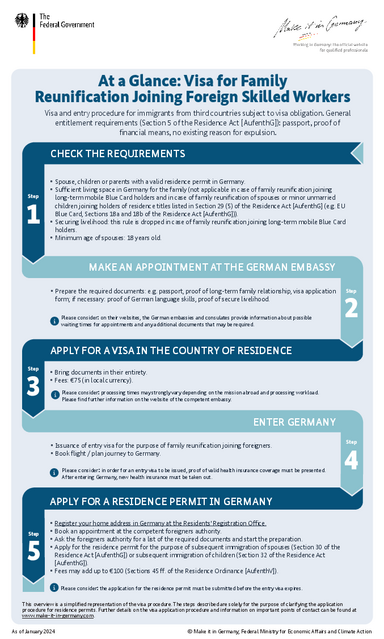
At a glance: Visa for family reunification joining foreign skilled workers
From the preparations to the application forms: This step-by-step guide shows you how to obtain a visa for family reunification.

Why not live together with your family in Germany? Find out what you need to know if your spouse from outside the EU wants to come and live with you.
As a national of a third country, you may move to Germany together with your spouse. The applicable regulations depend, among other things, on your spouse’s nationality.
Would you also like to live in Germany with your children in addition to your spouse? Find out about the applicable regulations in the section “Family reunion for children”.
If you are from a third country and your joining spouse is a citizen of an EU or EEA Member State or of Switzerland, he or she benefits from the right of free movement. This means that the joining family member may live and work in Germany without any restrictions. For entry into Germany, he or she only needs a valid identity card.
You can look forward to a future together in Germany, even if your partner comes from a third country. The following requirements must be met for a spouse to join their skilled worker from a third country:
No proof of German language skills is required for family members joining a skilled worker with a valid residence title in Germany. However, to ensure that they feel at home in Germany and are able to cope with everyday life, your family members should be able to communicate independently in German. To find out how this can be achieved, see our “Learning German” section.

Unmarried partners can also benefit from family reunification if they meet the conditions for spousal reunification. It is important that the civil partnership entered into under foreign law essentially corresponds to the types of civil partnership that were possible in Germany until 2018. In principle, this means that:
The same applies to civil partnerships between two people of the same sex or where at least one person is neither female nor male.
Nationals of Andorra, Australia, Brazil, El Salvador, Honduras, Israel, Japan, Canada, Monaco, New Zealand, San Marino, the Republic of Korea, the United Kingdom of Great Britain and Northern Ireland, and the United States of America who come to Germany for the purpose of family reunification may enter Germany without a visa and then apply for the required residence permit directly at the competent foreigners authority .
If your spouse requires a visa to enter Germany, he or she must apply for a visa for family reunification for spouses. The visa can be applied for online via the Consular Services Portal of the Federal Foreign Office or directly at the German embassy . A list of all missions of the Federal Republic of Germany abroad can be found under Advisory and Contact Services.
To apply for a visa for the purpose of family reunification, you will generally need to produce a passport and a marriage certificate, civil partnership certificate or registered partnership certificate. Check with your local German embassy to find out what other documents are required. As the processing of your application may take some time, we recommend that you find out in advance what documents are required for your application and that you submit your application well in advance.
Once your family has arrived in Germany, you will need to register your family members with the Residents' Registration Office. Before the visa expires, you must apply for a residence permit from the local foreigners authority. Book well in advance as there are often long waiting lists for appointments. To apply for a residence permit, you will need to provide the relevant passports, birth and marriage certificates, pay slips or tax statements, rental evidence and any other documents that may be required depending on your family’s specific situation.
As soon as the residence permit is issued, your spouse (registered civil partner) is immediately entitled to take up employment in Germany without restriction.
If your visa or residence permit for gainful purposes was issued for the first time after 1 March 2024, you have the option of bringing your parents or parents-in-law to Germany. To find out what rules apply to parental reunification, contact the relevant German embassy or foreigners authority in Germany.
In addition to the option of parental reunification, your family members are permitted to enter Germany for temporary family visits. Information on visas for family visits can be found on the websites of the German embassies.

From the preparations to the application forms: This step-by-step guide shows you how to obtain a visa for family reunification.
Let us advise you on your opportunities to work and live in Germany. Our experts will support you with questions regarding job search, visa, recognition and learning German.
You can find out more about the various contact options by clicking on one of the icons in the bar below.
Please switch to a modern browser (e.g. Google Chrome, Firefox or Microsoft Edge) in order to enjoy the best user experience.